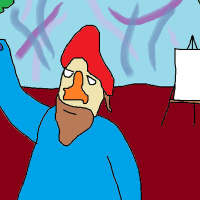Поруке: 13
Језик: English
carozy (Погледати профил) 18. септембар 2014. 21.21.24
I am just beginning (like this week) to learn Esperanto. So far I like it. I'm somewhere in the teens of the Bildoj Kaj Demandoj course. For those who are fairly fluent in Esperanto, I'd like to know how did you achieve that? What courses should did you take and in what order? Did you use flashcards or Anki? I have not set up my Anki yet and have not been using flashcards. I've been just going over the lessons again when I have time.
What would you recommend for a beginner like me?
Any responses would be appreciated. Thanks for your help!
Carolyn
Scratch (Погледати профил) 18. септембар 2014. 23.53.08
My path wasn't particularly structured. I do remember putting some time in with a flashcard set at Memrise to help teach me vocabulary. I did some of one of the beginner courses on here as well, then I worked my way through reading Gerda Malaperis. I also began listening to the Radio Verda podcasts to hear the language spoken. Then eventually I found Esperanto translations of books such as Jane Eyre, Alice in Wonderland, A Christmas Carol, and Dr. Jekyll and Mr. Hyde. I also purchased La Hobito. So I read through those books multiple times and began to find that I was often reading for longer and longer stretches without having to translate.
That gave me pretty strong passive facility with the language. I can listen to people speak and read Esperanto fairly well now. Now I'm working on making it an active skill by corresponding with others and I'm slowly finding it easier and quicker to write thoughts out in Esperanto.
That's what's worked for me. It may not be the fastest way, but I have had fun with it, probably in large part because I've always loved to read and that was the biggest element of how I learned.
So yeah, that's other important thing. Find a way that you enjoy doing and have fun with. It's a lot easier to do some daily study if you find it to be fun.
kaŝperanto (Погледати профил) 19. септембар 2014. 12.34.24
I have had a long and somewhat inconsistent start to learning Esperanto. For starters I studied a lot of Spanish in school so the more basic aspects of the grammar came very easily to me. I started with an online version of a postal course here. The course attracted me for being very simple and straightforward, and I could view the lessons on my then HTC Touch Windows Mobile phone. I was a freshman in college at the time (spring '09), but I never really got much farther than learning basic grammar and vocab.
The next year I used Esperanto as a speech subject in my communications class, so I kind of got into it again. But that year was 18 credit hours of engineering classes for two semesters, so I didn't get much time for Esperanto.
Then randomly one summer I logged in to Lernu again and looked around. I then got a postcard at Lernu from toni692 and ended up in a good long conversation with him (and he corrected all of my mistakes in every message). This gave me the bug and solidified my desire to master the language. I became a fairly active "lurker" at the forums for a few months and was reading through a free textbook on google books to advance my knowledge a little more, but then I let school get in the way again. It wasn't until about a year and a half ago or so that I made this new account and started actively participating in the forums and messages and whatnot (my old account name was in english and I wanted to have an esperanto name).
I think the best thing I've done to advance my abilities has been to participate in the forums and instant messenger here at Lernu. Actively using the language for more than just reading is key. I have read very little in Esperanto other than forum posts (but enough to know good Esperanto), and I generally try to post whenever I can. I am also reading La Hobito, albeit much slower than Scratch here (vocab is my main limiting factor now, other than time).
The best tips I have are:
1) Learn the grammar thoroughly. Know every rule inside and out, including the tricky bits of the accusative; they matter more than you think and you lose some depth if you don't know them.
2) Learn all of the correlatives thoroughly. You don't want to have to look up these words.
3) Learn the prepositions, and other words with the ambiguous "-aux" ending which have varying grammatical functions. These are relatively few, and they pop up enough that it's worth focusing on them before attacking more general vocabulary. I'm talking about words like antaux, anstataux, kvazaux, apenaux, etc.
4) Begin participating in the forums or elsewhere so you actively use Esperanto as early as possible. At first you'll be looking up almost every word, but that's how you'll learn.
5) Once you think you know the grammar, check out "Being Colloquial in Esperanto". It is a great book and is available free online.
Most of all, have fun!
carozy (Погледати профил) 19. септембар 2014. 15.42.21
I believe I also have a Teach Yourself Esperanto book, but I moved at the start of summer and I'm afraid it's buried in a box somewhere in the garage right now. Maybe I should dig it out though.
Thanks again for your input! Very helpful.
Carolyn
kaŝperanto (Погледати профил) 19. септембар 2014. 16.17.56
carozy:Thank you both for your responses. I plan on trying to communicate once I start the Mi estas komencanto course because that has a lot of useful phrases for initial conversations with people. I also am excited about reading some books in Esperanto. I wonder how do people find the books? I guess just a google search? Also, how do I learn the grammar? Maybe in the introduction section of this website? I have only just begun exploring this website, and just figured out the electronic dictionary on the right, lol.The postal course I took (link in previous post) is a good intro to the grammar and introductory vocabulary words. There are some exercises as well, and you could post your answers here to be checked. I don't have much experience with the Lernu courses, since I had already finished the other course before coming here. They seem to cater to different learning styles than that course, so I would explore everything to see what teaches you the best.
I believe I also have a Teach Yourself Esperanto book, but I moved at the start of summer and I'm afraid it's buried in a box somewhere in the garage right now. Maybe I should dig it out though.
Thanks again for your input! Very helpful.
Carolyn
You can buy books and other things at the Esperanto USA website. That is where I bought La Hobito and my green star lapel pins.
There are also free books online, one of which was recently linked to in the forums (so I still have it up in my browser): Librejo
You'll probably need to at least complete a basic course before trying to read anything serious. The Vere aux Fantazie book in the library here at Lernu is a good intro-level piece, as it only uses a small group of words and builds on them through combinations as you read further (but again, you need to know the grammar).
Scratch (Погледати профил) 19. септембар 2014. 17.46.16
carozy:Thank you both for your responses. I plan on trying to communicate once I start the Mi estas komencanto course because that has a lot of useful phrases for initial conversations with people. I also am excited about reading some books in Esperanto. I wonder how do people find the books? I guess just a google search? Also, how do I learn the grammar? Maybe in the introduction section of this website? I have only just begun exploring this website, and just figured out the electronic dictionary on the right, lol.Some of the books are at Gutenberg.org. Kaŝperanto's link to Librejo also has a multitude of PDFs of translated literature.
I believe I also have a Teach Yourself Esperanto book, but I moved at the start of summer and I'm afraid it's buried in a box somewhere in the garage right now. Maybe I should dig it out though.
Thanks again for your input! Very helpful.
Carolyn
I forgot to mention that I have Teach Yourself Esperanto. I find it very useful for times when I need to understand better the grammar, so it's a good one to dig out if you can.
I very much recommend doing Gerda Malaperis after you complete a beginner's course or two. The story is written to step you along, even as a komencanto you will find the early passages to be fairly easy, plus you can listen to the audio files of it as well. Then once you've read Gerda, you can even watch a film adaptation of it on Youtube. It's not the greatest story, but it does a very good job of teaching vocabulary and grammar.
mamadespik (Погледати профил) 19. септембар 2014. 19.12.14
These are very silly and childish at times, but it very simple grammar and vocab, in applied situations, to help beginners. They remind me of Sesame Street from my childhood, but that style of language acquisition clearly worked for our mother tongues, so why not try it again for Esperanto!
sudanglo (Погледати профил) 20. септембар 2014. 09.28.29
1) Learn the grammar thoroughlyI concur. It won't have escaped your attention that the 'rules' of Esperanto are much more productive than those of the natural languages.
Courses in natural languages tends to concentrate on the usage of native speakers - learning to say what the good speakers of the language say.
This approach is much less relevant in the case of Esperanto.
There are relatively few cases where what seems to be a well-formed sentence in Esperanto is not what the competent speakers say. I would imagine that there are hardly any cases where a sentence that follows the rules or systemic principles of Esperanto will not be understood, or make you sound ridiculous.
carozy (Погледати профил) 20. септембар 2014. 22.27.27
All these responses have been very helpful, so thanks again!
Alkanadi (Погледати профил) 22. септембар 2014. 06.07.20
carozy:I am a beginner also. I have gone through all the courses on this website. I suggest that you do the same. I am going through the Ana Pana course again and I am finding it so much easier than the first time.
What would you recommend for a beginner like me?






